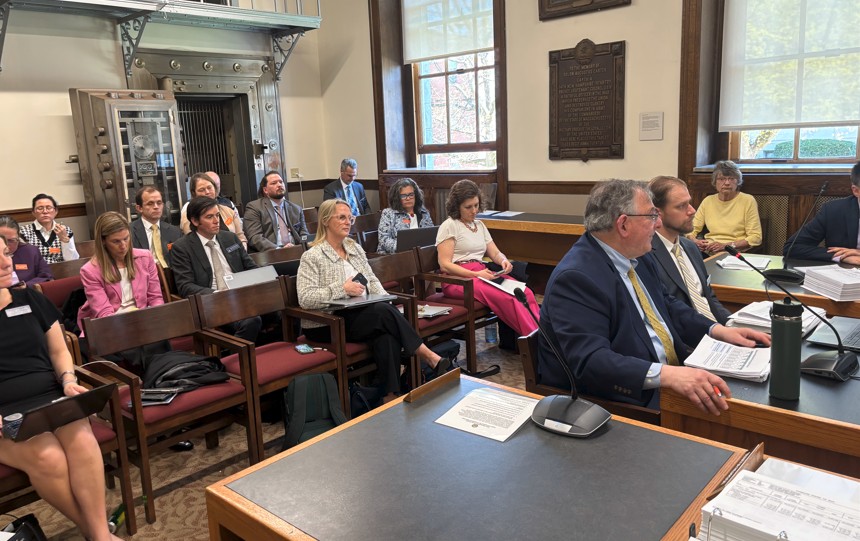By PAULA TRACY, InDepthNH.org
CONCORD – From newborn health checks to providing care for the elderly at the Glencliff Home, to a potential loss of the state’s 50-year old family planning program, impacts of a House proposed budget got a Senate Finance hearing Monday.
The Republican controlled House, fearing a shortfall in revenue, has recommended a general fund budget cut of $290 million for the next two years for the state Health and Human Services Department.
A copy of the department’s detailed PowerPoint presentation for its seven divisions can be found here: https://gc.nh.gov/lba/budget/operating_budgets/2026-2027/Senate_Finance/DHHS_Senate_Finance_Presentations_4-28-25.pdf
The hearing is ongoing and will resume Tuesday afternoon.
New revenue numbers are expected later this week, which may help the Senate find new places where they do not have to cut.
The Republican controlled House budget cuts include a $52.5 million reduction by 3 percent in Medicaid rates for medical providers and cuts to community mental health programs.
But the Senate now has a chance to revisit those cuts envisioned as part of the House-passed, biennial budget and also look to the priorities of Gov. Kelly Ayotte who has opposed a number of the cuts.
She has indicated health care for the most vulnerable in the state as a priority.
PUBLIC HEARING ON BUDGET SCHEDULED
A public hearing on the budget will be held May 6 beginning at 1 p.m. in Representatives Hall in the State House before the Senate Fiscal Committee. It is expected to go into the evening.
Those who would like to submit comments can do so here https://gc.nh.gov/remotecommittee/senate.aspx but there will not be a remote comment option and those who want to testify need to attend in person.
A huge portion of the state budget is within the Health and Human Services Department.
It covers a wide range of services all aimed at keeping the public healthy.
The department is not only facing state budget cuts, but from the federal government which has announced plans to claw back $80 million in post COVID-19 programs which the state is appealing through an administrative process, the committee was told that was submitted last week.
Some said that by cutting state funding for some programs the state would lose its federal funding match.
Henry Lipman, state Medicaid director, said the program has a small amount that comes from general funds from the state and most of it is federal.
New Hampshire has one of the highest levels for Medicaid qualifications for children, Lipman said, in fact it is the fifth highest level.
He is anticipating the change would affect 8,500 of the 90,000 children served.
By tightening Medicaid the state is returning to pre public health emergency Medicaid coverage amounts, he said.
WORK REQUIREMENTS FOR MEDICAID
Part of the budget proposal out of the House is a plan to include a work requirement.
Lipman said the department would have to stand up a program to verify and with a tough labor market and a state freeze on hiring, there would need to be a lot of work which would pose a staffing burden.
Sen. Howard Pearl, R-Loudon, who sponsored the bill said, “I’m certainly open to listening to suggestions.”
Sen. Cindy Rosenwald, D-Nashua, asked about concerns for those facing addiction treatment and feared some will no longer be enrolled and that might drive up uncompensated care.
Lipman said it could be a consequence.
FUNDING OF FAMILY PLANNING FUNDING ELIMINATED
Iain Watt, division director for the state Division of Public Health, which oversees everything from testing tainted food to the Women Infants and Children, to newborn screenings and testing lead in paint indicated that responding to disease and the need for clean water, food and adequate health care fall under the DHHS realm.
He said he hoped that the Senate would give a second look at retaining the family health program noting there could be “massive gaps” in care.
Asked by Rosenwald if there would be other providers, Watt said it would be “extremely challenging” as many care providers are feeling the crush of patients to their practices and some programs are far away.
“What we are seeing is a real risk,” to loss of care options, he noted.
Nathan White, chief financial officer for DHHS and Morissa Henn, deputy commissioner kicked off the hearing with an overview.
Henn noted the symbolic weight of the thick printed binders in front of each Senator saying “they speak for themselves.”
She said the department has 15 core initiatives and are very happy with progress made so far and hope that as “we tighten our belts,” the state does not lose traction on those.
White said while much of the reductions in the governor’s budget and House version include eliminating vacant positions, it is the back of the budget cuts which are quite large and “put us in a difficult spot.”
Unlike many departments DHHS gets roughly 50 percent of its budget from federal funds and mostly they involve employee pay and the back of budget reductions start to paint a very different picture.
Rosenwald asked for some examples of how the back of the budget cuts would look.
White said he feels it is too early to tell based on what the Senate might do and what might be added back from the House version.
He said the focus will be on what will provide the least amount of harm.





